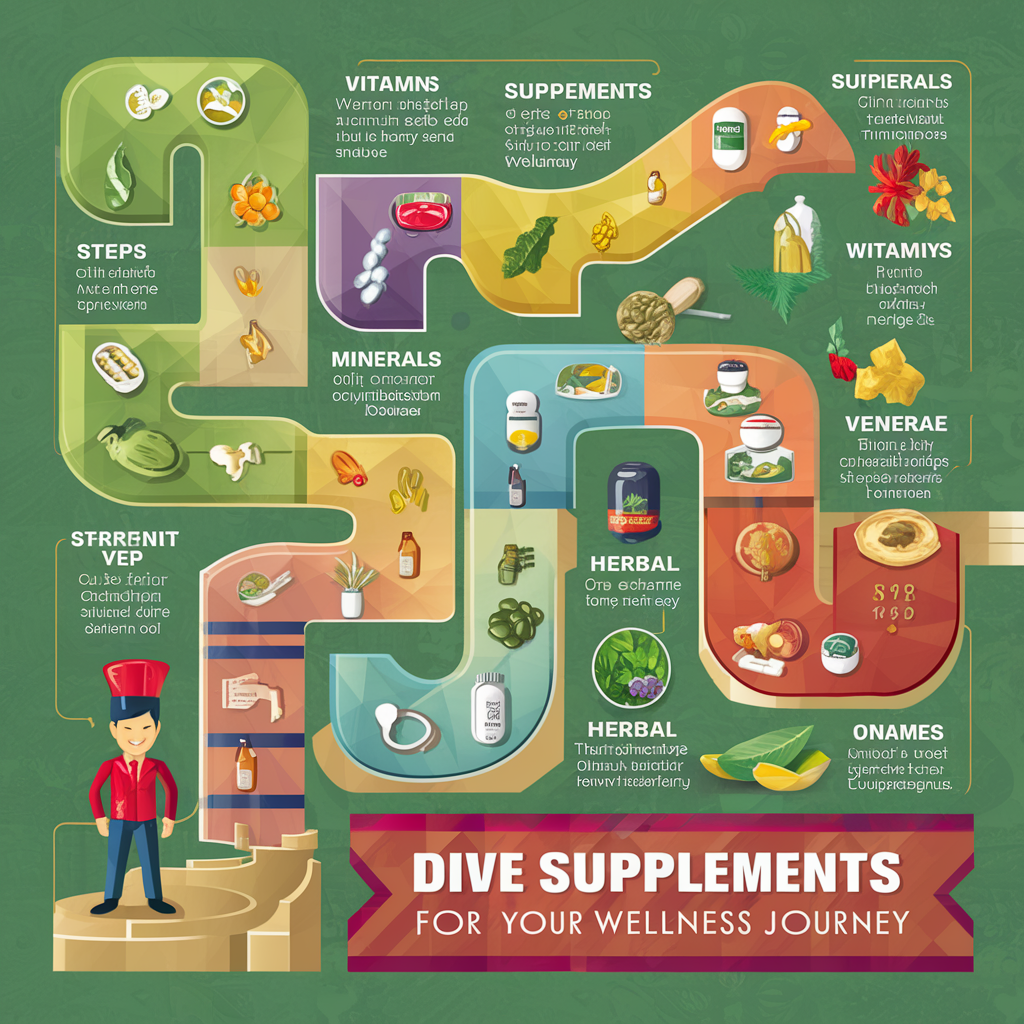Navigating the World of Supplements for Your Wellness Journey
There was a time when I thought supplements were just fancy pills marketed to gullible gym-goers and trendy health enthusiasts. But as I dove deeper into the wellness world, I realized that navigating the supplement maze is more complex—yet fascinating—than I initially believed. With an explosion of products promising everything from enhanced energy to better sleep, it’s easy to feel overwhelmed. So, how does one sift through the noise? Let’s explore this together.
Understanding the Basics: What Are Supplements?
Supplements come in all shapes and sizes—pills, powders, liquids, and even gummies (because who doesn’t love a good gummy bear?). They’re designed to augment your diet and provide nutrients that might be missing or lacking. Now, don’t get me wrong: a balanced diet should always be your primary source of nutrition. But sometimes, life gets in the way, and that’s where these little helpers step in.
The Categories of Supplements
Supplements can generally be divided into a few key categories:
- Vitamins and Minerals: These are the classics. Think vitamin C, iron, calcium—essential for various bodily functions.
- Herbal Supplements: Often derived from plants, these include everything from ginseng to turmeric. Some studies suggest they can offer various health benefits.
- Amino Acids: The building blocks of protein, essential for muscle repair and growth. Think of them as the support crew for your workout.
- Probiotics: Often dubbed “good bacteria,” these can aid digestion and boost your gut health—something I learned the hard way after many questionable pizza choices in college.
- Protein Supplements: Shakes, bars, and powders that can help meet your protein needs, especially for active lifestyles or those with dietary restrictions.
Taking a closer look at these categories can help you determine what might be beneficial for your personal wellness journey. But remember, not all supplements are created equal, and the quality can vary significantly.
Why Consider Supplements?
You might be asking yourself, “Why should I bother with supplements?” Well, let’s break it down. There are several reasons why someone might consider adding supplements to their routine:
- Dietary Gaps: Maybe you’re a vegetarian or vegan trying to get enough B12, or perhaps you’re a busy professional who struggles to eat enough fruits and veggies.
- Aging: As we age, our bodies might require different nutrients. For instance, older adults often need more vitamin D and calcium.
- Increased Physical Activity: If you’re hitting the gym hard or training for a marathon, your nutritional needs may increase, and supplements can help meet those demands.
- Health Conditions: Certain medical conditions can lead to nutrient deficiencies, making supplements a valuable addition (always consult with a healthcare professional first!).
A Personal Anecdote
Let me share a quick story. A few years back, I was training for a half-marathon. I felt great, but my energy levels were dipping. I started supplementing with iron and B vitamins after a chat with my doctor. Talk about a game-changer! Suddenly, I was back to my sprightly self, able to tackle those long runs without feeling like I was dragging a boulder behind me.
Choosing the Right Supplements
With so many options on the market, how do you choose wisely? First and foremost, it’s crucial to do your research. Here are some steps to help you make informed decisions:
1. Assess Your Needs
Before jumping into a sea of vitamins and minerals, take a moment to assess your specific needs. Are you experiencing fatigue? Looking for a boost in immunity? Or perhaps you want to support your joint health? Knowing what you want to achieve will guide your choices.
2. Consult with Professionals
While it might be tempting to self-diagnose, I recommend consulting with a healthcare provider or a registered dietitian. They can help you navigate the complexities of your individual needs and recommend appropriate supplements. I vividly recall the time I asked a nutritionist about my protein intake. I ended up learning more than I could’ve imagined about how my body processes different types of protein.
3. Research Quality Brands
Not all supplements are made equal! Look for reputable brands that provide transparency in their sourcing and manufacturing processes. Seek those that have been third-party tested. A little bit of detective work can save you from falling for subpar products.
Potential Risks and Side Effects
It’s easy to think of supplements as harmless, but they can have side effects, especially if taken in excessive amounts. For example, too much vitamin A can lead to toxicity, and excessive iron can cause gastrointestinal issues. I once tried a popular detox supplement, thinking it was a quick fix, only to end up feeling worse. Lesson learned!
Here are some potential risks to keep in mind:
- Interactions with Medications: Some supplements can interfere with prescription medications. Always consult with your healthcare provider before starting something new.
- Overconsumption: More isn’t always better. It’s crucial to follow recommended dosages and not exceed them.
- Quality Control: The industry isn’t as tightly regulated as you might think, which can lead to inconsistencies in potency and purity.
Popular Supplements and Their Benefits
Let’s take a closer look at some of the most popular supplements and explore what they can offer:
Vitamin D
This vitamin is crucial for bone health and immune function. Many people find themselves deficient, especially in colder months when sunshine is scarce. A good supplement can help maintain optimal levels.
Omega-3 Fatty Acids
Commonly found in fish oil, omega-3s are known for their anti-inflammatory properties. They can support heart health and cognitive function. Just be prepared for the fishy aftertaste—some brands have mastered the art of masking it, but not all!
Magnesium
This mineral plays a role in over 300 biochemical reactions in your body. It can help with muscle function, energy production, and even promote better sleep. I’ve found that a magnesium supplement is like a warm hug for my muscles after a tough workout.
Probiotics
As mentioned earlier, these are the good bacteria that can support gut health. A healthy gut can impact everything from digestion to mood. However, not all probiotics are created equal, so choosing the right strain is essential.
When to Take Supplements
Timing can be crucial too. Some supplements are better absorbed with food, while others might be best taken on an empty stomach. For instance, fat-soluble vitamins like A, D, E, and K should be taken with a meal that contains fat for better absorption. It struck me that I used to take my vitamin D in the morning, only to realize that a little avocado toast would’ve made it more effective!
Real-Life Experiences: Testimonials and Success Stories
While personal anecdotes are great, let’s not forget the power of testimonials. Many people have experienced significant changes in their wellness journeys thanks to proper supplementation. Take Sarah, for instance—she struggled with fatigue for years until she discovered that iron supplements made a world of difference. Or consider Jake, who swears by probiotics for keeping his digestive issues at bay. Hearing these stories brings a sense of community to the often solitary journey of wellness.
Maintaining a Balance
As you embark on your supplement journey, keep in mind that balance is key. Supplements should complement a healthy diet, not replace it. I remember a friend who relied solely on protein shakes, thinking they could replace whole foods. Spoiler alert: it didn’t end well. A well-rounded diet rich in fruits, vegetables, whole grains, and lean proteins will always be your best bet.
Staying Informed: Continuing Your Education
The world of supplements is ever-evolving, with new research emerging all the time. To stay informed, consider subscribing to reputable health and nutrition blogs, following expert social media accounts, or even participating in webinars. Knowledge is power, and the more you know, the better equipped you’ll be to make informed choices about your health.
In Conclusion
Navigating the world of supplements can feel like trying to find your way through a dense forest—sometimes confusing, occasionally daunting, but ultimately rewarding. With the right information, a bit of guidance, and a sense of curiosity, you can find the supplements that work best for you.
Remember to assess your needs, consult with professionals, and prioritize quality. Embrace the journey, and don’t shy away from experimenting (responsibly, of course). Who knows? You might just stumble upon the perfect supplement that propels you towards your wellness goals. And don’t forget to share your experiences—after all, we’re all in this together!
Now, what are you waiting for? Go ahead and take that first step in your wellness journey—your body will thank you!






